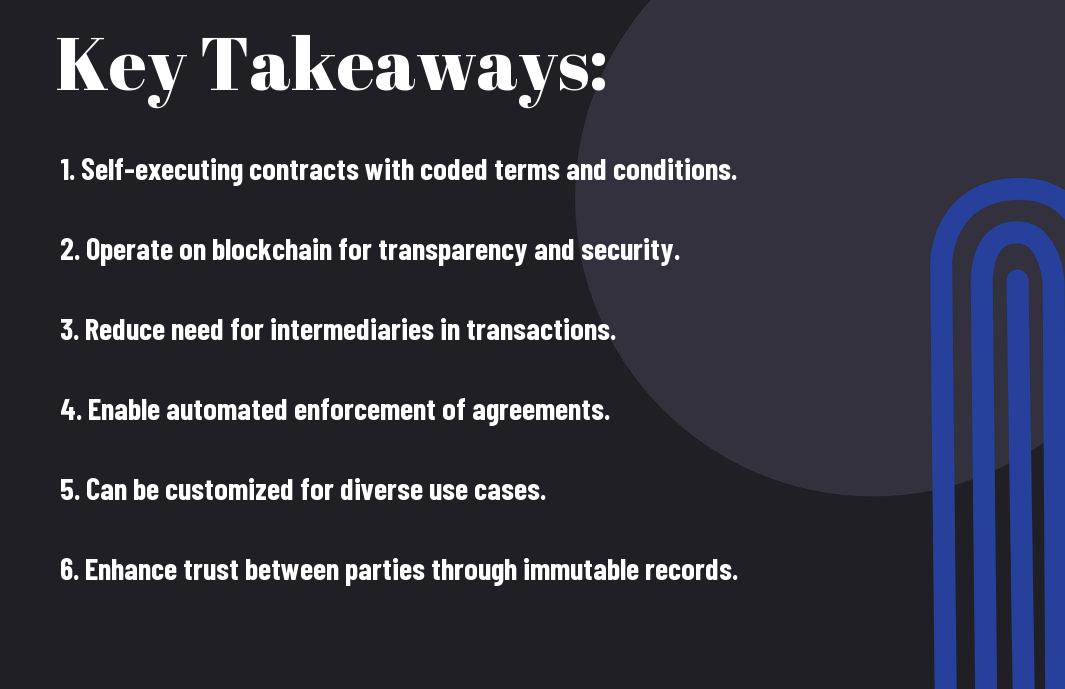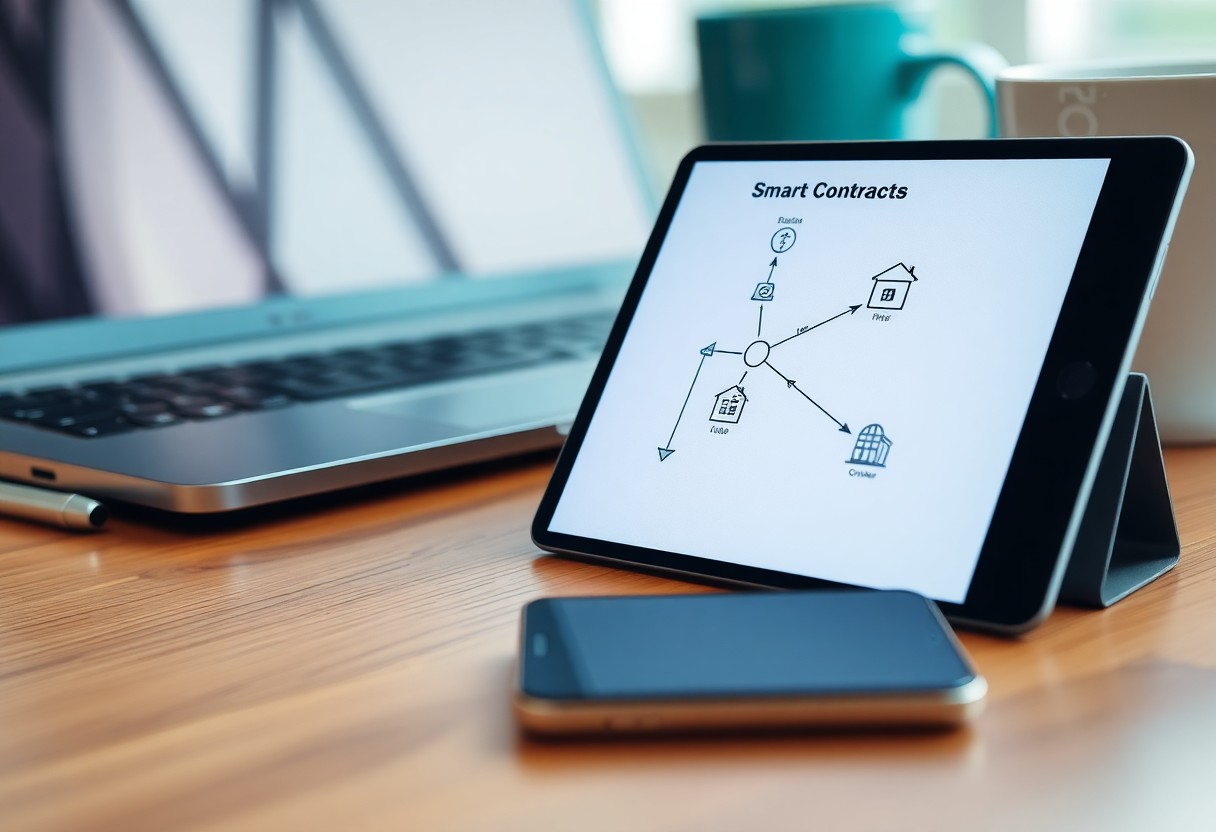Over the last few years, you may have heard about smart contracts emerging as a groundbreaking technology in the world of blockchain and digital transactions. These self-executing contracts automatically enforce and execute terms directly between parties without the need for intermediaries. By understanding smart contracts, you can leverage their benefits, streamline your agreements, and enhance security in your transactions. This post will guide you through the necessarys of smart contracts, allowing you to make informed decisions in your digital dealings.
Key Takeaways:
- Smart contracts are self-executing agreements with the terms of the contract directly written into code, allowing for automated execution when predetermined conditions are met.
- They operate on blockchain technology, ensuring transparency, security, and immutability, which minimizes the risk of fraud and disputes.
- Smart contracts can streamline processes and reduce costs in various industries, including finance, supply chain, and real estate, by eliminating the need for intermediaries.
Definition of Smart Contracts
To understand smart contracts, you need to recognize them as self-executing agreements with the terms directly written into code. They operate on blockchain technology, which allows for transparent, secure, and immutable execution without the need for intermediaries. This innovation minimizes the reliance on traditional legal frameworks while enabling automation and efficiency in various transactions.
Key Characteristics
Definition of smart contracts involves several key characteristics: they are automated, secure, and transparent. Smart contracts automatically execute actions when pre-defined conditions are met, ensuring accuracy and reducing human error. The use of blockchain technology provides a secure environment where contract terms are visible and cannot be altered, fostering trust among parties involved.
Differences from Traditional Contracts
For traditional contracts, the execution relies on human intervention and legal enforcement, often involving intermediaries such as lawyers or notaries. In contrast, smart contracts automate the entire process, relying solely on coded instructions to execute agreements instantly and without external input.
Understanding the differences between smart contracts and traditional contracts highlights the unique advantages smart contracts offer. Unlike traditional agreements that can be subject to misunderstandings or disputes requiring legal resolution, smart contracts eliminate such risks by being self-enforcing. The transparency of blockchain technology ensures all parties have access to the same information, significantly reducing the chances of fraud or manipulation. This shift towards automation not only increases efficiency but also decreases costs associated with contract management, making smart contracts an attractive solution for various industries.


How Smart Contracts Work
If you are curious about the mechanics behind smart contracts, you’ll find they operate on decentralized networks to facilitate, verify, and enforce agreements automatically. They utilize self-executing code to ensure that specified terms are met before any transactions occur, removing the need for intermediaries and enhancing efficiency in various industries.
Blockchain Technology
Behind the scenes, smart contracts rely on blockchain technology to maintain transparency and security. This decentralized ledger records all transactions and contract executions, ensuring that once a contract is deployed, it cannot be altered or tampered with. This transparency builds trust among participants, enabling you to engage confidently in digital agreements.
Execution Process
At every stage of the execution process, smart contracts follow predetermined rules coded within them. Once triggered by specific conditions, they automatically enforce actions such as fund transfers or data sharing, streamlining operations while minimizing the risk of human error.
Also, once the conditions of a smart contract are met, the system executes the associated actions seamlessly and without delay. This automation ensures that all parties can trust the outcome without needing to monitor the process continuously. You can focus on your business goals, knowing your transactions will be executed accurately and efficiently based on the agreed-upon terms.
Use Cases of Smart Contracts
All industries are beginning to realize the transformative potential of smart contracts. From finance to real estate, these self-executing agreements streamline processes, reduce costs, and increase transparency. You can leverage smart contracts to enhance security and efficiency in a variety of applications, paving the way for innovation in your business practices.
Finance and Banking
On the financial front, smart contracts automate transactions, allowing for quicker settlements and lower fees. You benefit from enhanced security, as these contracts execute automatically when conditions are met, minimizing human error. This technology can streamline loan agreements and facilitate peer-to-peer transactions, revolutionizing your banking experience.
Supply Chain Management
By implementing smart contracts in supply chain management, you enable real-time tracking and transparency for all parties involved. These contracts ensure that all transactions and shipments occur as agreed, reducing disputes and inefficiencies. You can see how this technology helps create a seamless flow of information from producers to consumers.
A further benefit of using smart contracts in supply chain management is the ability to improve traceability. You gain insights into each product’s journey, verifying its origin and ensuring compliance with regulations. This fosters trust among stakeholders and enhances your brand’s reputation. Overall, you position yourself to better manage resources and respond quickly to market demands.
Advantages of Smart Contracts
Not only do smart contracts enhance transaction reliability, but they also streamline operations, reducing the need for intermediaries. This helps you to avoid miscommunications and errors while also speeding up contract execution. As your dependency on manual processes diminishes, you benefit from increased transparency and security, making smart contracts an appealing option in the digital landscape.
Efficiency and Speed
Smart contracts automate processes, ensuring quicker transaction times by executing agreements immediately once predetermined conditions are met. This functionality means you can bypass traditional bureaucratic delays and achieve faster outcomes, allowing you to allocate your resources more effectively.
Cost Reduction
Advantages of smart contracts lead to significant cost reductions for users by minimizing the involvement of intermediaries and decreasing administrative expenses. By automating tasks that typically consume manpower, you can streamline your operations and save money.
Indeed, implementing smart contracts reduces expenses across various sectors by cutting out the need for lawyers, brokers, and other intermediaries. The elimination of these costly middlemen allows you to focus your finances on core business activities rather than overhead costs. Additionally, the automation of contract execution minimizes the risk of human error, which can lead to costly disputes and delays, effectively saving you both time and money in the long run.

Challenges and Limitations
Many individuals and organizations are exploring the potential of smart contracts, yet various challenges and limitations can hinder their widespread adoption. Issues such as scalability, the complexity of coding, and potential legal implications can create obstacles for you as you consider utilizing smart contracts in your projects.
Legal Recognition
About the legal status of smart contracts, it varies significantly across jurisdictions. Some regions recognize them as enforceable agreements, while others remain uncertain, which could impact your decision to implement such technology in legally binding situations.
Security Risks
Challenges arise regarding the security of smart contracts, as vulnerabilities in code can be exploited, putting your assets at risk. Ensuring the integrity of smart contracts requires rigorous testing and auditing to prevent potential manipulation or unforeseen bug exploits.
Indeed, the security risks associated with smart contracts cannot be overstated. Malicious actors may target vulnerabilities in code, leading to financial losses and reputational damage for you. Implementing best practices, such as thorough code audits and development within well-established frameworks, is crucial in minimizing these risks and safeguarding your investments.
Future of Smart Contracts
Despite current challenges in regulation and interoperability, the future of smart contracts holds immense potential. As industries explore decentralized solutions, you can expect to see increased automation and efficiency in business operations. The integration of smart contracts with emerging technologies may broaden their appeal and functionality, leading to widespread adoption across various sectors in the coming years.
Industry Adoption Trends
Among the various industries, finance, supply chain management, and real estate are leading the way in adopting smart contracts. You might notice how these sectors are leveraging the technology to enhance transparency, reduce costs, and streamline processes, paving the way for a more innovative and efficient future.
Technological Advancements
About the evolution of digital infrastructure, advancements in blockchain technologies such as scalability, security, and interoperability are driving the maturation of smart contracts. You will see how these improvements facilitate more robust applications, ultimately enhancing user trust and satisfaction.
Advancements in artificial intelligence and machine learning are also contributing to the sophistication of smart contracts. You can expect future iterations to incorporate predictive analytics, enabling contracts to adapt to changing conditions in real-time. By integrating these technologies, you will benefit from more reliable and versatile contracts that can respond dynamically to various circumstances in your operations.
Q: What are Smart Contracts?
A: Smart contracts are self-executing agreements with the terms of the contract directly written into code. They run on blockchain technology, ensuring that transactions are secure, transparent, and immutable. When predetermined conditions are met, smart contracts automatically execute the terms, eliminating the need for intermediaries and reducing the time and costs associated with traditional contracts.
Q: How do Smart Contracts work?
A: Smart contracts operate on blockchain platforms like Ethereum, where they are deployed as code. Once created, the smart contract resides on the blockchain and is accessible to all parties involved. When an action occurs—such as a payment being made—the smart contract checks the conditions specified in the code. If the criteria are fulfilled, the contract executes the necessary actions without any manual intervention. This process ensures trust and efficiency in transactions.
Q: What are the advantages of using Smart Contracts?
A: There are several advantages to using smart contracts. Firstly, they enhance security, as the data is stored on the blockchain, making it difficult to alter or delete. Secondly, they increase efficiency, as transactions can be executed automatically without the delay of manual processes. Additionally, smart contracts reduce costs by eliminating intermediaries, minimizing fees associated with traditional contract enforcement. Finally, they offer greater transparency since all participants have access to the contract’s terms and the transaction history.





